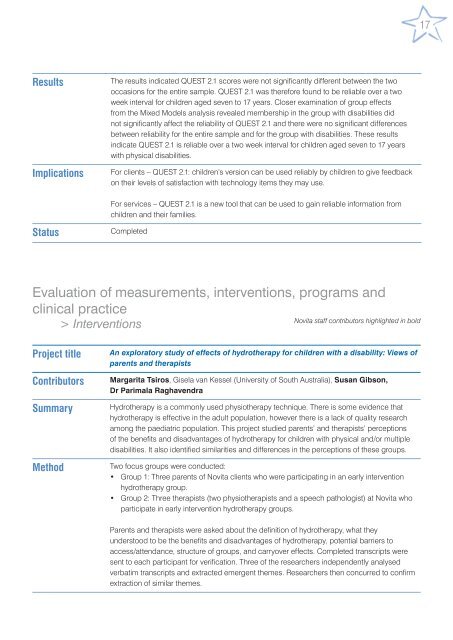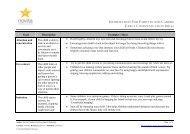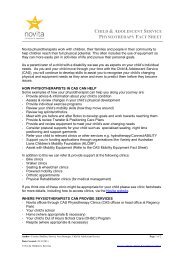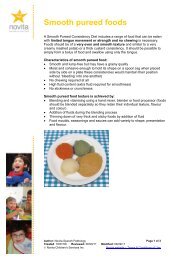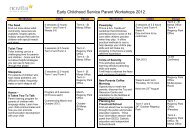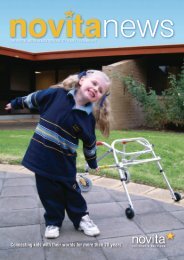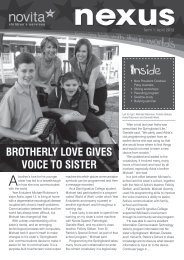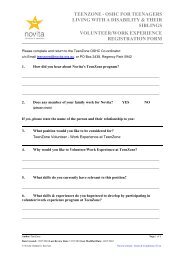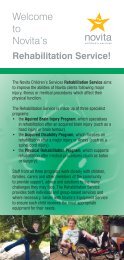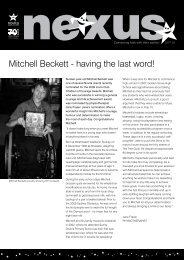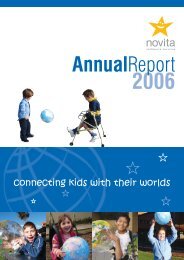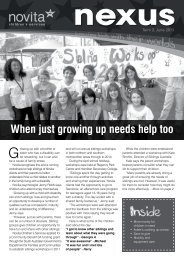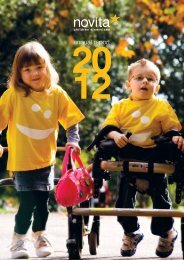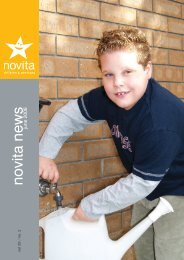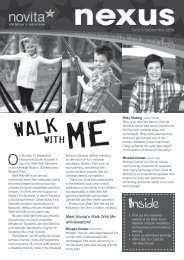Novita Research Report - 2004 to 2007 - Novita Children's Services
Novita Research Report - 2004 to 2007 - Novita Children's Services
Novita Research Report - 2004 to 2007 - Novita Children's Services
- No tags were found...
You also want an ePaper? Increase the reach of your titles
YUMPU automatically turns print PDFs into web optimized ePapers that Google loves.
17ResultsImplicationsThe results indicated QUEST 2.1 scores were not significantly different between the twooccasions for the entire sample. QUEST 2.1 was therefore found <strong>to</strong> be reliable over a twoweek interval for children aged seven <strong>to</strong> 17 years. Closer examination of group effectsfrom the Mixed Models analysis revealed membership in the group with disabilities didnot significantly affect the reliability of QUEST 2.1 and there were no significant differencesbetween reliability for the entire sample and for the group with disabilities. These resultsindicate QUEST 2.1 is reliable over a two week interval for children aged seven <strong>to</strong> 17 yearswith physical disabilities.For clients – QUEST 2.1: children’s version can be used reliably by children <strong>to</strong> give feedbackon their levels of satisfaction with technology items they may use.For services – QUEST 2.1 is a new <strong>to</strong>ol that can be used <strong>to</strong> gain reliable information fromchildren and their families.StatusCompletedEvaluation of measurements, interventions, programs andclinical practice> Interventions<strong>Novita</strong> staff contribu<strong>to</strong>rs highlighted in boldProject titleContribu<strong>to</strong>rsSummaryMethodAn explora<strong>to</strong>ry study of effects of hydrotherapy for children with a disability: Views ofparents and therapistsMargarita Tsiros, Gisela van Kessel (University of South Australia), Susan Gibson,Dr Parimala RaghavendraHydrotherapy is a commonly used physiotherapy technique. There is some evidence thathydrotherapy is effective in the adult population, however there is a lack of quality researchamong the paediatric population. This project studied parents’ and therapists’ perceptionsof the benefits and disadvantages of hydrotherapy for children with physical and/or multipledisabilities. It also identified similarities and differences in the perceptions of these groups.Two focus groups were conducted:• Group 1: Three parents of <strong>Novita</strong> clients who were participating in an early interventionhydrotherapy group.• Group 2: Three therapists (two physiotherapists and a speech pathologist) at <strong>Novita</strong> whoparticipate in early intervention hydrotherapy groups.Parents and therapists were asked about the definition of hydrotherapy, what theyunders<strong>to</strong>od <strong>to</strong> be the benefits and disadvantages of hydrotherapy, potential barriers <strong>to</strong>access/attendance, structure of groups, and carryover effects. Completed transcripts weresent <strong>to</strong> each participant for verification. Three of the researchers independently analysedverbatim transcripts and extracted emergent themes. <strong>Research</strong>ers then concurred <strong>to</strong> confirmextraction of similar themes.


